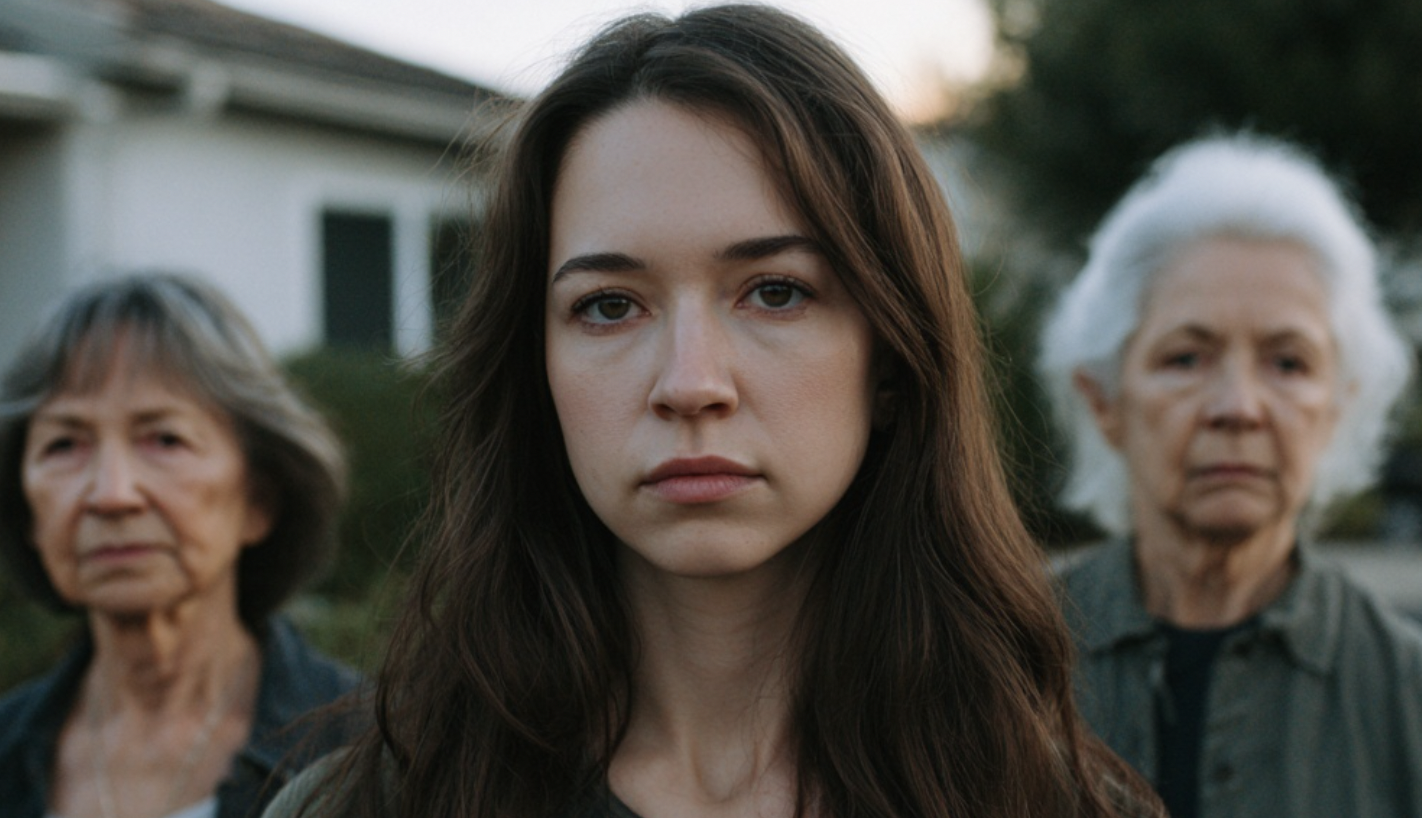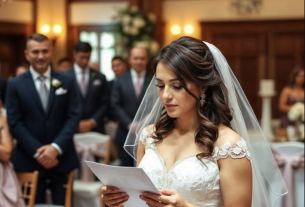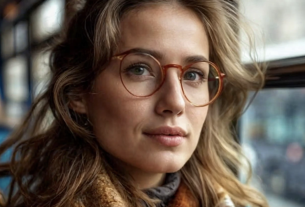“Let the one you gave the apartment to take care of you.”
The words hung in the cramped kitchen like shards of broken glass. Yulia slowly set her phone on the table beside an untouched mug of cooling tea. For a few seconds the screen still glowed with the contact “Grandma,” then went dark.
She leaned back against the creaking chair and closed her eyes. Everything inside her trembled—whether from anger or relief, she couldn’t tell. At last she had said it. After so many years of silence, forced smiles, and polite “of course, Grandma,” she had let it all out.
Outside the rented studio on the outskirts of the city, cars droned by. Somewhere a stairwell door slammed, the garbage chute clanged. Ordinary life in an ordinary bedroom district, where Yulia had been renting for two years.
—
It had all started long before that call. When Yulia was five, her grandmother, Margarita Ivanovna, doted on her. The little girl with light-brown braids helped around the house: dusted the shelves, watered the violets on the windowsill, rolled out dough with a tiny rolling pin.
“You’re my little ray of sunshine,” Grandma would say, kissing the crown of her head. “You’ll grow up to be the prettiest and the smartest.”
Soon after, Yulia’s father, Sergey, divorced her mother and married Larisa—a strict woman with tight-pressed lips. A year later the family welcomed Vladislav. Vladik. The heir, the bearer of the family line, the long-awaited grandson.
Yulia remembered the day she first felt the shift. She was eight. She and her father had come to Grandma’s for the weekend. Margarita Ivanovna fussed around two-year-old Vladik, cooing over his every move.
“Here you go, Yulenka,” Grandma said, slipping a crumpled hundred-ruble note into her hand. “Buy yourself an ice cream.”
At the same time, she handed Vladik a brand-new remote-controlled car that cost three thousand.
“Look how clever he is!” Margarita exclaimed. “Two years old and he already knows which buttons to press!”
At family gatherings, the adults murmured at the table, casting glances at the children. “A boy has more prospects,” “Vladik will go far,” “With talent like that…” Yulia sat quietly, poking at her salad with a fork, feeling like an extra at someone else’s celebration of life.
As the years passed, the difference only grew. When Yulia got into university on a state-funded spot, Grandma offered a dry congratulations over the phone. When Vladik moved up to the fifth grade of a prestigious gymnasium, she threw a family dinner with cake.
—
At university, Yulia lived in a dorm. Four people to a room, a shared kitchen on the floor, showers by schedule. Her father sent money now and then—“for the bare essentials.” Grandma didn’t ask after her at all.
One January evening, returning to the frozen dorm after a shift at a café, Yulia opened her social media. A photo popped up on her phone: Grandma and fifteen-year-old Vladik at a festive table. Flowers, gifts, beaming faces. “My golden grandson!” the caption read.
Yulia stood at the bus stop, snow blowing under the hood of her old jacket. In that moment something in her finally broke. The resentment she had spent years trying to smother, explain away, justify, hardened into a cold, solid sense of injustice.
“Why?” she asked the empty, snow-covered street. “What for?”
There was no answer. Only the wind flung prickly snowflakes into her face.
In the dorm, her roommates were already asleep. Yulia slipped to her bed without turning on the light. She sat down without undressing. Textbooks and notes lay on the nightstand. She had an exam tomorrow, she needed to study. She opened her notebook, but the letters blurred before her eyes.
—
On her twenty-fourth birthday, Yulia received inexpensive but sweet gifts from friends: a mug with cats, a notebook, a pair of earrings. Her mother, with whom she had lived after her parents’ divorce, gave her a simple silver ring.
“I’m sorry, honey,” her mother said, hugging her. “Once I get my bonus, I’ll buy you something nicer.”
“Mom, don’t,” Yulia answered with a genuine smile. “I’m happy as is.”
A letter arrived from Grandma. Inside—five thousand rubles and a card with boilerplate wishes.
Two months later, Vladik turned eighteen. Yulia learned about the party by accident—her father was on the phone with Larisa and didn’t notice his daughter come in to grab some documents.
“Yes, the restaurant’s booked… No, Margarita Ivanovna said she’ll pay herself… The main gift will be a surprise…”
What the surprise was, Yulia learned a week later from her father’s conversation with a friend.
“Can you believe it? Mom gave Vladik an apartment!” Sergey Nikolaevich said, unable to hide his pride. “A two-room in the center. Says the grandson should have his own place.”
Yulia stood outside the study door, clutching the folder of documents she’d come to pick up. A roar filled her ears. An apartment. Two rooms. In the center.
She pictured her rented studio on the edge of town. Peeling walls, a leaky faucet, neighbors through thin plaster. She remembered living on instant noodles in the dorm, wearing out old jeans, counting every kopeck.
“And Yulka?” her father’s friend asked. “What did she get?”
“She’s a girl,” Sergey waved it off. “She’ll get married, her husband will provide.”
—
The call came on a Saturday morning. Yulia was making breakfast—two eggs and tea. Saving money, as always.
“Yulia, it’s Grandma,” Margarita’s voice sounded irritated. “Can you imagine, my sister Anka is at it again! Says I’m raising Vladik wrong, spoiling him! How dare she!”
Yulia stirred the eggs in the pan without a word.
“Are you listening?” Grandma snapped.
“I’m listening.”
“She’s always been like that, envious. Has no children of her own, yet she lectures me. And I give our little Vladyusha only the best—he’s a boy, he has to make his way in life!”
“Uh-huh,” Yulia answered mechanically.
“All right, there’s no talking to her, the old fool. When I get old and feeble—you’ll be the one to look after me. Vladik will be a busy man, he’ll have a career, a family…”
Something inside Yulia gave way. Like a taut string snapping.
“And what am I, not a person?” she asked quietly.
“What are you saying? Of course you’re a person. But you’re a girl; it’s your place to look after your elders.”
“My place?” Yulia turned off the stove. “My place?”
“Well, yes. It’s a woman’s duty.”
Memories surged like a wave. The five-thousand-ruble birthday envelope. The apartment for Vladik. “Buy yourself an ice cream.” Expensive gifts for the beloved grandson. The frozen dorm. Cheap noodles. Hand-me-down clothes.
“You know what, Grandma,” Yulia’s voice was calm and cold. “Let the one you gave the apartment to take care of you.”
—
After those words, Yulia hung up. Her hands didn’t shake. Inside she felt empty and at peace.
Half an hour later her father called.
“Who do you think you are?!” he roared into the phone. “How dare you talk to your grandmother like that?!”
“I spoke just fine.”
“She raised you, she cared for you!”
“When?” Yulia asked. “When did she care for me, Dad?”
“Don’t you dare talk like that! Call her this instant and apologize!”
“No.”
“What do you mean, ‘no’?!”
“I mean no. I won’t apologize for telling the truth.”
Her father kept shouting, but Yulia wasn’t listening anymore. She set the phone on the table and sat by the window. Outside, snow was falling—big, soft flakes.
That evening she went to the store. She walked along the snowy streets, a grocery bag in her hands. Simple groceries for a simple dinner in a simple rented apartment. But for the first time in many years, Yulia felt free.
No more forced smiles. No more pretending everything was fine. No more trying to earn a love that had never existed.
At home she put the kettle on, sliced some bread, took out some cheese. An ordinary dinner for a solitary person. But there was a certain charm to this solitude—no one expected her to be grateful for scraps of attention, no one demanded she be a “good girl.”
Yulia sat at the table and propped her chin on her hand. The window reflected a young woman with a tired but peaceful face. Twenty-four years old. Her whole life ahead. Her own life.
—
Six months passed. Yulia changed jobs—she joined a small but promising company. Her salary went up, and she was able to start saving. She still lived in the same rented apartment, but now it was by choice, not necessity.
She and her father rarely spoke. He tried calling a couple of times, insisting she “come to her senses” and “stop acting foolish.” Yulia calmly replied that she was doing fine and ended the call.
Grandma never called again. From acquaintances, Yulia heard that Margarita now told everyone about the ungrateful granddaughter who had “turned her back on the family.” Let her talk.
Sometimes, rarely, Yulia thought about Vladik. It wasn’t his fault. He’d simply been lucky enough to be born a boy in a family where that mattered. He had an apartment, a car his father gave him, and the boundless love of his grandmother. Yulia wished him no harm. Their paths had simply diverged.
On a winter evening, almost a year after that conversation, Yulia sat by the window with a big mug of tea. The city rustled outside—cars, people, life. A contract lay on the table—she had finally saved up for a down payment on her own place. A tiny studio on the outskirts, but her own.
Her phone buzzed. An unknown number.
“Yulia?” The voice was elderly, trembling. “This is Aunt Anya, your grandmother’s sister.”
“Hello.”
“I’m calling… Margarita is in the hospital. Her heart. Vladik’s on a business trip, Sergey and Larisa are at the dacha. There’s no one to go see her.”
Yulia was silent. Something stirred in her chest—not pity, not anger. Just weariness.
“Please tell her I wish her a swift recovery,” she said evenly. “But I can’t come.”
“I understand,” Aunt Anya replied unexpectedly. “I understand everything, dear. It’s her own fault. I just thought maybe you…”
“No. I’m sorry.”
Yulia hung up. She stood by the window, looking at the city lights. Somewhere out there, in one of those hospitals, lay the woman who had once called her a “ray of sunshine.” But that ray had gone out long ago.
Yulia finished her tea, picked up the contract, and began carefully rereading the terms. Tomorrow she had to go to the bank to sign the mortgage. To start a new life. Her own life, where no one decided her worth or what she deserved.
Snow fell outside. The city lived its own life. And so did Yulia—quietly, steadily, without looking back. There was no resentment or anger left in her eyes. Only a firm certainty: other people’s decisions and gifted apartments do not determine your fate. Each person builds their own life.
And she was building hers. Day by day, brick by brick. Without help, without support—but also without any debt of gratitude for things she’d never been given.



